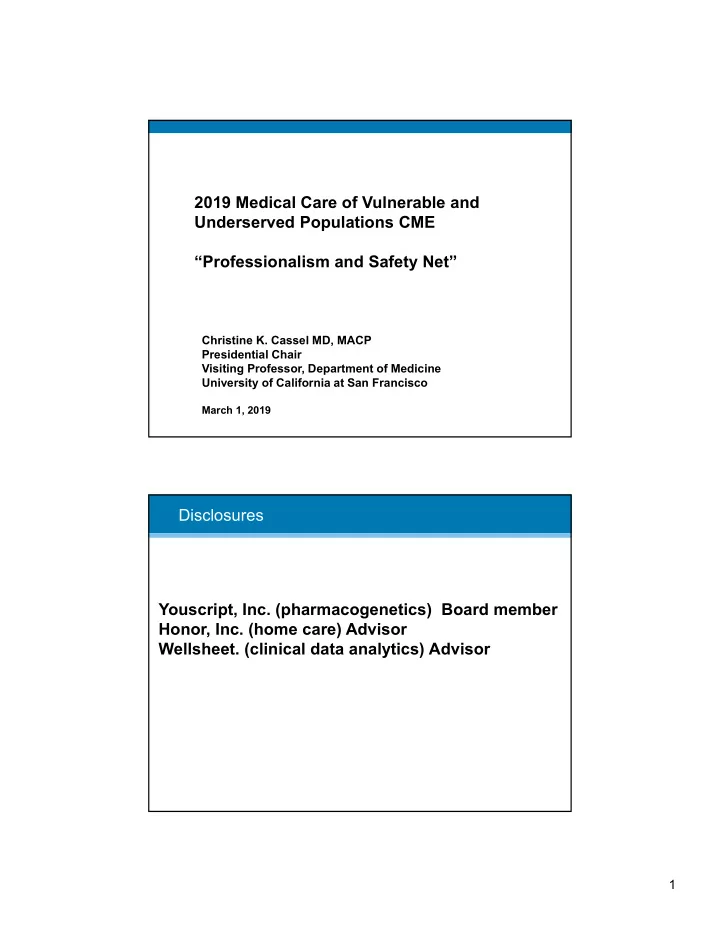

2019 Medical Care of Vulnerable and Underserved Populations CME “Professionalism and Safety Net” Christine K. Cassel MD, MACP Presidential Chair Visiting Professor, Department of Medicine University of California at San Francisco March 1, 2019 Disclosures Y Youscript, Inc. (pharmacogenetics) Board member Honor, Inc. (home care) Advisor Wellsheet. (clinical data analytics) Advisor 1
Definition of professionalism Professionalism is the basis of Medicine’s contract with society. It demands placing the interests of patients above those of the physician, setting and maintaining standards of competence and integrity, and providing expert advice to society on matters of health. Essential to this contract is public trust in physicians, which depends on the integrity of both individual physicians and the whole profession. Physician Charter on Professionalism, ABIM Foundation- ACP Foundation—European Federation of Internal Medicine, 2002 Articles on Medicine and Professionalism 2
Challenges to Professionalism Market Forces Payment Models and Incentives Consumerism Technology Social Determinants of Health Burnout The Physician Charter on Professionalism Fundamental Principles • patient welfare • patient autonomy • social justice Professional Responsibilities Commitment to • professional competence • honesty with patients • patient confidentiality • maintaining appropriate relations with patients • improving quality of care • improving access to care • just distribution of finite resources • scientific knowledge • maintaining trust by managing conflicts of interest • professional responsibilities Simultaneously published in The Lancet and Annals of Internal Medicine in February 2002. Republished on the Charter’s 10 th anniversary in 2012 in Annals of Internal Medicine . abimfoundation.org 3
Healthcare Spending OECD 2017 4
Healthcare Squeezing Out Other Priorities Employees Face Rising Healthcare Costs 5
Can we separate politics from healing? Not if we care about the vulnerable and underserved. RUDOLF VIRCHOW Medicine is a social science, and politics nothing else but medicine on a large scale SOCIAL MEDICINE Diagnosing and treating the ills of sick societies Ernest Amory Codman, MD (1869 – 1940) “Every hospital should follow every patient it treats long enough to determine whether or not the treatment has been successful, and then to inquire, ‘If not, why not?’ with a view to preventing similar failures in the future.” 6
Charles R. Drew, MD (1904 – 1950) “There is no scientific basis for the separation of the bloods of different races except on the basis of the individual blood types or groups.” This slide fulfills the AB 1195 requirement for incorporating cultural and linguistic competency into continuing medical education. Sidney R. Garfield, MD (1906 – 1984) Prepayment “brings the patient to the doctor earlier in his illness and more often, which is one of the most important effects … because it permits the practice of true preventive medicine.” 7
H. Jack Geiger, MD (born 1926) “The last time I checked my textbooks, the specific therapy for malnutrition was, in fact, food.” This slide fulfills the AB 1195 requirement for incorporating cultural and linguistic competency into continuing medical education. “Dr. Mona” 8
Profiles in Professionalism Virchow—the challenges we face are not new, they are core to the moral base of our profession Codman—stay true to the public interest, and if your institution betrays that trust find (or establish!) another one Drew—Science is the core to effective advocacy, work within influential organizations as much as possible, take the high road publicly. Garfield—think outside the box, seek practical solutions for families and workers that advantage their employers. Leverage power. Geiger—use whatever government organizations you can find, read the fine print, be strategic about going public, media can help your cause. Hanna-Attisha—if you see something, say something! Opportunities for Leadership Professionalism is not only about individual heroism Systems science Data analytics Population health Civic engagement Government roles Institutional Professionalism 9
Promising Tools, Promising Futures: Delivery Systems Reform Payment reform • Electronic health information Better data, better measures • New teamwork models Big data capabilities • New treatments Precision medicine • Systems engineering Palliative medicine • Empowered consumers 10
Charter on Professionalism for Health Care Organizations Patient Partnerships: engagement, shared decision making, collaboration, continuity and coordination, quality metrics Organizational Culture: well-being of people, teamwork, health/safety, inclusion/diversity, accountability Community Partnerships: social determinants, access and high value, community benefit Operations and Business Practices: safeguard privacy, ethical practices, manage conflicts of interest, align incentives with values, fair compensation, education and development, reduce waste, innovation, accounting standards, price transparency The Future of Professionalism Professionalism may not be sufficient to drive the profound and far-reaching changes needed in the health care system, but without it, the health care enterprise is lost. — Lesser et al 11
How Professionalism will Survive Professionalism needs to be recognized as a dynamic and evolving concept with a past present and future. …..leading to these questions What constitutes leadership in a world of teams and systems? What does digital professionalism look like? Does professionalism require civil disobedience? Is professionalism a cause of burnout, or an antidote? Understanding Medical Professionalism, Levinson, Ginsburg, Hafferty and Lucey, 2015 The Physician Charter on Professionalism Fundamental Principles • patient welfare • patient autonomy • social justice Professional Responsibilities Can this charter Commitment to guide us? What’s • professional competence • honesty with patients missing? • patient confidentiality • maintaining appropriate relations with patients • improving quality of care • improving access to care • just distribution of finite resources • scientific knowledge • maintaining trust by managing conflicts of interest • professional responsibilities Simultaneously published in The Lancet and Annals of Internal Medicine in February 2002. Republished on the Charter’s 10 th anniversary in 2012 in Annals of Internal Medicine . abimfoundation.org 12
Recommend
More recommend